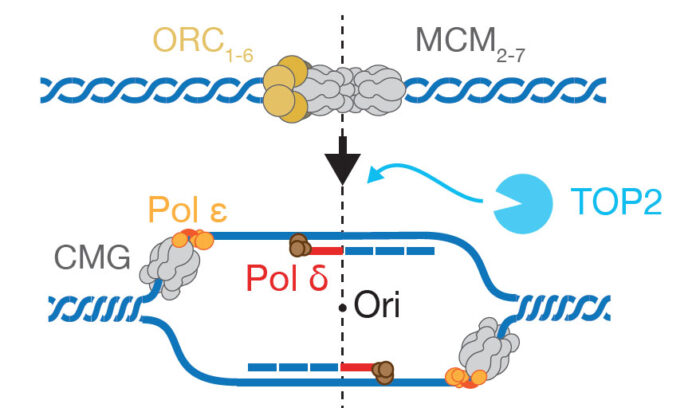Activation of DNA replication origins triggers mutagenesis and DNA breaks which contributes to genetic and phenotypic diversity in human populations

One of the universal events in the lifecycle of every cell is the initiation of genome duplication. Julian Sale’s group in the LMB’s PNAC Division has used recent qualitative and quantitative high-resolution maps of human replication origins to show that the initiation of replication is associated with the formation of DNA breaks and triggers a local increase in mutation rates. By characterising the mutagenic footprint of replication initiation, they have shown that mutagenesis at origins sculpts regulatory domains and drives the evolution of the human genome.
DNA replication initiation involves several events with the potential for local DNA damage and mutagenesis. These include the activation of the replicative helicases, origin DNA melting and a series of polymerase switches. Using the map of replication origins generated by Guillaume Guilbaud (in collaboration with Torsten Krude in the Department of Zoology, Cambridge), Pierre Murat has been able to unveil mutational patterns in the human genome at sites of highly-efficient origins. Thus demonstrating that replication initiation leaves specifics mutational footprint. This is the first time that origin activity has been directly linked to mutagenesis. Pierre was further able to break down the pattern of mutations into two distinct processes. While the first process triggers DNA breaks at the origins, the second process operates in their immediate vicinity and is consistent with error-prone DNA synthesis. The presence of breaks at origins was confirmed using a new technique called INDUCE-seq, which allows the very precise mapping of DNA break (developed by Simon Reed’s group, University of Cardiff, and was carried out in collaboration with their company Broken String Biosciences.)
While the work was led by Pierre Murat, important contributions were also made by other members of Julian’s group, Consuelo Perez (who holds a Milstein Studentship funded by the Darwin Trust of Edinburgh), Alastair Crisp and Guillaume Guilbaud.
Overall, this study shows that the inescapable process of initiating DNA replication comes with a mutagenic penalty. Further research may show the impact that this form of mutagenesis has on the evolution of cancer genomes, especially as this is a crucial example of when replication origin firing is dysregulated.
The work was funded by UKRI MRC and the Darwin Trust of Edinburgh.
Further references
DNA replication initiation shapes the mutational landscape and expression of the human genome. Murat, P., Perez, C., Crisp, A., Van Eijk, P., Reed, SH., Guilbaud, G., Sale, JE. Science Advances. Vol 8, Issue 45.
Determination of human DNA replication origin position and efficiency reveals principles of initiation zone organisation. Guilbaud, G., Murat, P., Wilkes, HS., Lerner, LK., Sale, JE., Krude, T. Nucleic Acids Research. Vol 50, 7436-7450.
Julian’s group page
Darwin Trust of Edinburgh
Broken String Biosciences
Previous Insight on Research articles
A simple, novel mechanism to safeguard the integrity of the human genome